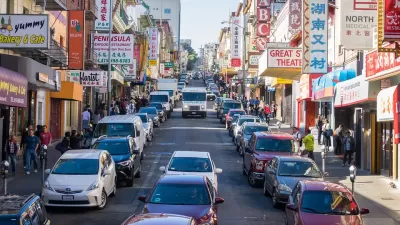The Golden Gate Bridge District, in agreeing to apply congestion pricing to the bridge, has saved the $158 million Urban Partnership grant for the Bay Area in the nick of time, but has created turmoil with S.F because of where the revenue goes.
The Golden Gate Bridge District's Friday meeting "degenerated into an angry war of words between San Francisco and North Bay members of the bridge district's board of directors, which approved a resolution to charge tolls that rise and fall with the level of traffic but prohibited the use of any of the proceeds to help pay for a new Doyle Drive approach to the bridge in San Francisco.
The two motions passed on 10-8 votes, split along geographic lines. Before the board meeting, it appeared that the resolution would pass with wording that gave directors control over the toll proceeds and allowed the revenue to be used on San Francisco's Doyle Drive or for projects and services of the Golden Gate Bridge, Highway and Transportation District, including its ferries and buses.
But director Al Boro, San Rafael's mayor, made a motion to restrict the revenues to the bridge district, and a verbal brawl ensued."
Boro added the caveat to "quell fears that the congestion toll would be used to help pay the $1.1 billion reconstruction of San Francisco's Doyle Drive, creating (what has beed dubbed) a "commuter tax" on people who cross the bridge from Marin and Sonoma counties."
"Essentially, they declared war on San Francisco and on their own people, since they voted to allow a road that is deficient to go on for who knows how many years," San Francisco Supervisor Jake McGoldrick said in an interview after the meeting."
The deadline for receiving authority to apply congestion pricing on either the bridge or Doyle Drive, to meet the federal requirement to receive the $158 million grant is March 31. Had San Francisco chosen to toll Doyle Drive, thus controlling the revenues, they would have needed the state legislature's approval.
"The details of the new congestion toll, including its cost, will be figured out in the next six weeks. A June public hearing is scheduled. The toll could go into effect as early as September but must be in place by September 2009.
The toll will be in addition to another increase in the works: a proposed $6 cash, $5 FasTrak toll plan."
Thanks to Gerald Cauthen
FULL STORY: Bridge raises tolls, denies Doyle Dr. funds

Planetizen Federal Action Tracker
A weekly monitor of how Trump’s orders and actions are impacting planners and planning in America.

Restaurant Patios Were a Pandemic Win — Why Were They so Hard to Keep?
Social distancing requirements and changes in travel patterns prompted cities to pilot new uses for street and sidewalk space. Then it got complicated.

Map: Where Senate Republicans Want to Sell Your Public Lands
For public land advocates, the Senate Republicans’ proposal to sell millions of acres of public land in the West is “the biggest fight of their careers.”

Maui's Vacation Rental Debate Turns Ugly
Verbal attacks, misinformation campaigns and fistfights plague a high-stakes debate to convert thousands of vacation rentals into long-term housing.

San Francisco Suspends Traffic Calming Amidst Record Deaths
Citing “a challenging fiscal landscape,” the city will cease the program on the heels of 42 traffic deaths, including 24 pedestrians.

California Homeless Arrests, Citations Spike After Ruling
An investigation reveals that anti-homeless actions increased up to 500% after Grants Pass v. Johnson — even in cities claiming no policy change.
Urban Design for Planners 1: Software Tools
This six-course series explores essential urban design concepts using open source software and equips planners with the tools they need to participate fully in the urban design process.
Planning for Universal Design
Learn the tools for implementing Universal Design in planning regulations.
Heyer Gruel & Associates PA
JM Goldson LLC
Custer County Colorado
City of Camden Redevelopment Agency
City of Astoria
Transportation Research & Education Center (TREC) at Portland State University
Camden Redevelopment Agency
City of Claremont
Municipality of Princeton (NJ)




























